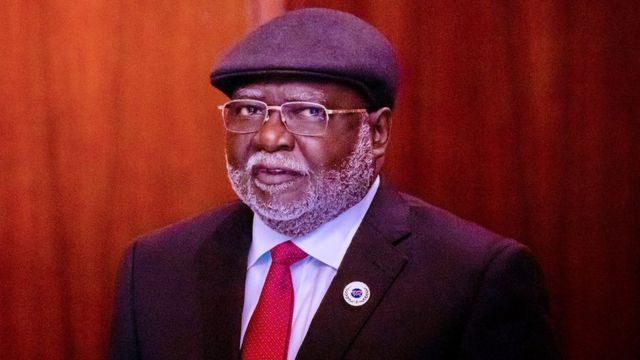The Chief Justice of Nigeria (CJN), Justice Olukayode Ariwoola, has said technology has fundamentally transformed how judges conduct legal proceedings these days.
He said judicial officers could not deny the fact that information technology and telecommunication services had surpassed the conventional method of court service delivery.
The CJN noted that the use of the internet had become a prominent feature of modernity with innovative and interactive influences on the public.
Justice Ariwoola said this at the Annual Workshop for Judges on Legal and Regulatory Issues in Telecommunications held at Bristol Palace Hotel in Kano.
The workshop, with the theme: The Adjudication Path in the Digital Era, was organised by the Nigerian Communications Commission (NCC) in collaboration with the National Judicial Institute (NJI).
The CJN said judges must embrace the transformation, stressing that justice delivery should remain the main at the fore-front of their efforts.
“Advancement in the telecommunications sector has assumed the central role in contemporary judicial work and life, both within and beyond the court room,” he said.
Justice Ariwoola urged judges to prioritise the examination of the convergence of data privacy and information security law.
The CJN noted that the enormous amount of data generated and accumulated in the digital realm raised critical questions about privacy, security, and the protection of individual’s rights.
He said the workshop would serve as a pivotal platform where the challenges presented by the digital revolution would effectively be discussed and solutions proffered.
To the participants at the workshop, Justice Ariwoola said: “Equip yourselves with the necessary information to deal with the digital era. As judicial officers, you are responsible for carefully assessing the legal implications of data collection, storage, and utilisation by striking a harmonious balance between fostering innovations and safeguarding privacy.”
Similarly, the NCC has donated 1.8 million digital devices to students of the Federal Government colleges in the six geo-political zones of the country.
The commission said besides the deployment of digital learning platforms for the students as the first phase of its programmes to empower Nigerian youths, about 2,600 youths had also benefited from its Digital Jobs Creation for Youths (DJC-Y) programme.
Danbatta announced this at the opening ceremony of the 12th edition of the Africa Youth Internet Governance Forum (AfYIGF) with the theme: Emerging Technologies: Leveraging Innovation for Sustainable Development and Youth Empowerment, at the Shehu Musa Yar’Adua Centre yesterday in Abuja.
The NCC boss, who was represented by the Head of the commission’s Internet Governance Unit, Ibiso Kingsley-George, said Africa had a burgeoning youth population which represented an opportunity and a challenge.
He said: “Harnessing the energy and creativity of Africa’s youth is crucial for the continent’s development.”
Danbatta explained that NCC had, over the years, embarked on programmes and policies aimed at enhancing youths’ participations in digital entrepreneurship, education, and empowerment to fast-track economic growth and development for the country.
He said: “Allow me to illustrate some of these initiatives. Through the National Digital Economy Policy and Strategy (NDEPS) 2020-2030, the commission has repositioned the youth for job opportunities through various initiatives.
“These include Digital Job Creation for Youths (DJCY). As at date, 2,600 youths have benefitted from both the physical and virtual platforms of the scheme, across the six geopolitical zones of the country.”
